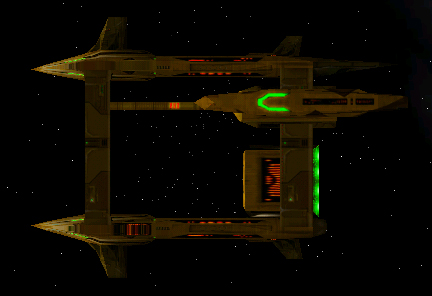Lion class (SFC)
As other powers began to construct dreadnoughts, the Lyran Star Empire wasted a lot of time debating the issue. As was traditional with the Lyrans, opinions were divided along clan lines. As a result, when the first Federation dreadnought, the Ulysses class, was commissioned in 2269, and the first Klingon C-8 class dreadnought was preparing to launch later that year, the Lyrans had not even begun construction on a dreadnought of their own. Panic finally produced a consensus and the design that could provide a dreadnought in the shortest amount of time was selected. Fortunately, the Lion class design proved to be very successful, and spawned two variant designs as well: the Gir Lion class heavy dreadnought and the Cave Lion class battleship.
Introduced in 2276, the DN-type featured a crew complement of 620, a capacity of eleven shuttlecraft, and was equipped with six science labs, six transporters, and six tractor beam emitters. The class was armed with four Expanding Sphere Generators, six banks of Type-4 disruptors, eight banks of Type-1 phasers, and six banks of Type-3 phasers. The DN remained in service until 2288, when it was superseded by the DNPP refit, introduced in 2282. The DNPP featured small improvements over the DN, and remained in service until 2300, when it was superseded by the DNP+ refit, introduced in 2288. The DNP+ featured stronger shields, and traded two of its Type-3 phasers for Type-1s.[1]
Lion class vessels
SFC Timeline
Enemy's Blood King • Homeworld Defender • Red Claw Glory • Thundercat • Thunderclaw • Thunderfang
Notes and References
- ↑ Bethke, Erik (Producer). Starfleet Command. Lead Designer: Erik Bethke. Senior Designer: Chris Taylor. Mission Scripting by Lance Watanabe. Campaign Mission Design by Scott Bennie. Game Design by Marc Hertogh and Tom Hughes. SFB Consultant: Tom Hughes. Interplay Inc.. 15 September 1999.

